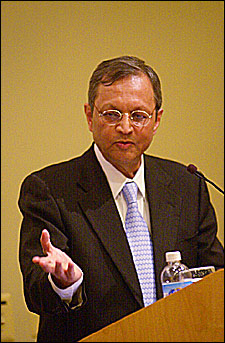Ambassador hails Indian-U.S. partnership
Says nations share democracy, diversity

India’s ambassador to the United States hailed a growing partnership between the two nations Tuesday (Feb. 8), saying the diversity of their populations and strength of their democracies align the two countries’ interests.
Ambassador Ronen Sen spoke before a group of about 75 students and faculty gathered in Boylston Hall’s Fong Auditorium. The event was sponsored by the South Asia Initiative.
Sen was introduced by South Asia Initiative Director Sugata Bose, the Gardiner Professor of Oceanic History and Affairs. Bose said Sen had served in many key posts over the years. He was India’s first ambassador to Russia after the collapse of the Soviet Union and served as ambassador to the newly unified Germany. In addition, Bose said, Sen played a role in India’s establishing of relations with China in 1988.
“We are very privileged to have one of India’s best diplomats here today,” Bose said.
Sen said that India’s politics stem from its society. The nation is home to one-sixth of the world’s population and has an enormous amount of diversity. That diversity has led to a saying, Sen said, that whatever you say about India will be true.
The diversity is also reflected in India’s commitment to democracy, Sen said. He drew parallels between India and the United States in both nations’ diversity and their commitment to democracy. The two nations also share interests in fighting global terrorism and stopping the proliferation of weapons of mass destruction.
“Both nations share concerns about security. Both believe freedom and democracy are the best guard against terrorism and the best chance for peace,” Sen said.
Sen said strengthening economic ties is an important priority for him as ambassador and he touted India’s information technology, biotechnology, and nanotechnology industries, as well as lower-tech industries such as textile manufacturing.
Though ties between the two nations have grown stronger, Sen said India will always remain independent.
“India has and always will retain independence of thought, but it can be a valued partner on shared issues,” Sen said.
Improving relations with Pakistan, which have been strained over the Muslim-dominated region of Kashmir, are a top priority for India, Sen said.
Sen answered questions about the nation’s refusal to accept relief aid to cope with the devastation from the December tsunami that swept the Indian ocean, saying that past experience with natural disasters convinced Indian officials that they could respond more quickly and more effectively on their own. He also said that India had the resources to adequately care for its own tsunami victims, so the aid was better sent to nations with fewer resources.




